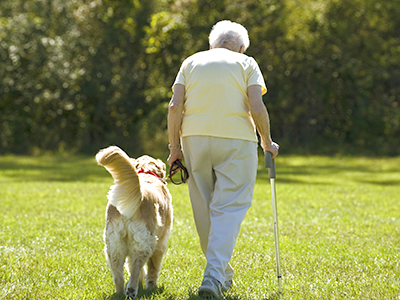Significant Drop in Walking Speed Predicts Future Cognitive Decline in Older Adults
June 5, 2016
Published by Vancouver Coastal Health Research Institute

While getting physically slower in later years is simply a part of getting older, a new study led by Vancouver Coastal Health Research Institute (VCHRI) scientist Dr. John Best spotlights how a significant decrease in gait speed is a possible predictor of future cognitive decline among older adults.
The study, recently published in the Journals of Gerontology: Series A: Biological Sciences and Medical Sciences, examined the more nuanced relationship between cognitive decline and gait speed, defined as a person’s usual pace over a fairly short distance (four to six metres), measured in metres per second.
“The link between slower gait and cognitive decline among older adults already exists in the literature; however, less clear is whether changes in one are preceding and leading to changes in the other or if, for example, cognitive decline and decreased gait speed are co-occurring or are bi-directional,” explains Dr. Best, a researcher at the Djavad Mowafaghian Centre for Brain Health and the Centre for Hip Health and Mobility. “The intent of our study was to look at these more complex questions, which are a bit more difficult to examine because you need longitudinal data and to revisit individuals over several time points in order to find these more nuanced relationships.”

Untangling the relationship between physical and cognitive performance may be helpful in identifying older adults who are at risk of mobility decline and progression to dementia.
Dr. Best and his colleagues were able to access the required data by collaborating with U.S. researchers and drawing from the Health, Aging, and Body Composition Study – a large longitudinal study of American older adults. The researchers looked at a cohort of 2,876 older adults (aged 70 to 79 years at baseline), with an equal sampling of men and women, who were all initially well-functioning community-dwellers studied over a nine-year period.
The study found that older adults who showed a decline in gait speed that was larger than the average decline found in their peers during the first half of the study period tended to show a stronger decline in cognition during the second half of the study period. And the reciprocal relationship was somewhat evident but certainly weaker.

“Our findings allow us to now say that these changes observed in gait speed during this period of time are important because they are predicting future decline in cognition,” says Dr. Best, who is also a research associate in the Department of Physical Therapy, Faculty of Medicine, at the University of British Columbia.
“The findings also point to a bit of directionality or a sequencing of aging such that you primarily see it in mobility first and then it might transition into changes in cognition later.”
“I’m happy to see that people are beginning to recognize and appreciate this association between our physical performance and our cognitive performance,” adds Dr. Best.
“And this is a fairly simple, clinically friendly measure of gait speed that only takes a couple of seconds to measure and can be incorporated easily into a clinician’s practice.”
The findings might also lead to researchers and clinicians being better able to define populations where intervention to improve cognitive performance would be of greatest benefit.
“To find the populations that would benefit from interventions intended to improve individuals’ cognitive performance, not only should we be using cognition as a risk factor but we should also be using mobility,” explains Dr. Best.
“Combining information from the two domains—cognition and mobility—may offer more specificity regarding who could really benefit from some sort of intervention to stave off cognitive decline.”
Category: Healthy Cognitive Aging, Adding Quality to Later Life Years, News